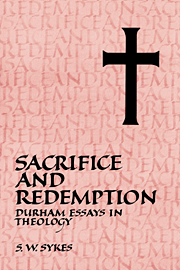Book contents
10 - Sacrifice in Puritan typology
Published online by Cambridge University Press: 10 March 2010
Summary
‘The sacrifice Christ doth placare Deo, appease an incensed God; our sacrifices do but placere Deum, please an appeased God’ (Mather 1705,188). The Reformation saw a serious revaluation of the place of sacrifice in Christian theology, which if it in one sense firmly diverted attention from the present to the past, from human acts to divine, in another allowed new value to be given to ‘sacrifice’ in the Christian life. The significance attached to Christians’ ‘spiritual sacrifice’ in one branch of developing Protestantism is to be investigated here, as it appears in devotional literature and commentaries produced by seventeenth-century puritans – English Protestants of the third or fourth generation. Sacrifice was not often a primary theme in their exposition of the Christian life, and yet, despite an untidiness of evidence, it is clear that certain allusions to sacrifice were conventional, part of a common rhetoric, a common imagery.
Returning to what they understood to be New Testament tradition, early Protestant reformers had taken up an Israelite distinction between propitiatory sacrifice for sin and a ‘peace-offering’ made in gratitude for present or hoped-for blessings. Christ's death was identified with the former and Christians’ self-offering or petition in Christ with the latter. These fundamentally different kinds of sacrifice, it was argued, had been confused by the Church's teaching on the place of works done in grace ‘making satisfaction’ for sin, and above all by the belief that in a priest's offering of the mass Christ's sacrifice was again presented to God.
- Type
- Chapter
- Information
- Sacrifice and RedemptionDurham Essays in Theology, pp. 182 - 202Publisher: Cambridge University PressPrint publication year: 1991
- 2
- Cited by

